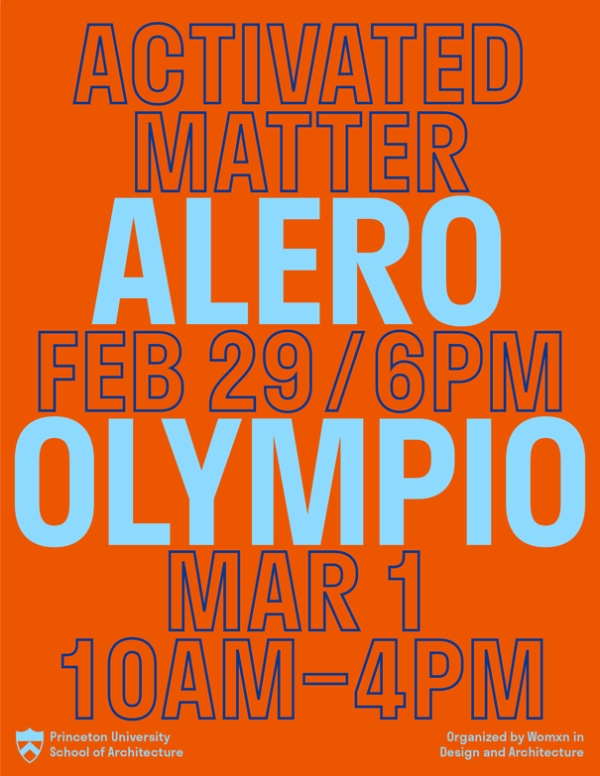Baerbel Mueller, I oA Dean and founder and head of [Applied] Foreign
Affairs ([A]FA)participates at the 2024 Womxn in Design and Architecture (WDA) Conference
@ Princeton
University
Conference participants: Lesley Lokko OBE, Baerbel Mueller, Nana Biamah-Ofosu, Erandi de Silva,
Renée C. Neblett, DK Osseo-Asare, among others.
Betts Auditorium
2024
Womxn in Design and Architecture (WDA) Conference
Alero Olympio: Activated Matter
Thursday,
February 29, 6PM
Friday, March 1, 10AM - 4PM
Betts Auditorium
Free and open
to the public
Organized
by Womxn in Design and Architecture (WDA, @princetonwda), a graduate student group formed in 2014 at Princeton University
School of Architecture, this annual conference celebrates the work and memory of a pivotal architect or designer with contributions
from international historians and scholars, in addition to artists, musicians, curators, and practitioners. The eighth Womxn
in Design Conference at the Princeton School of Architecture honors the life and work of the late Alero Olympio.
Alero
Olympio was an architect and builder of radical ecologies. Born in Ghana and working extensively between Scotland and her
homeland, Olympio theorized and exercised a rigorous dedication to social and environmental sustainability at all scales.
She envisioned building methods and materials as emergent sites of potential, rejecting industrialized products in favor of
inherited, place-specific knowledge systems. Locally sourced Laterite clay and African hardwood were essential materials in
her new architectural language, as she championed the ongoing protection of West African timber resources and delicate forest
ecosystems. Olympio’s work codified an intimately ecological approach to architecture, one embedded within the specific material
and social conditions of its place, and an innovative and distinctly African mode of practice.
Dynamic
and inspired, Olympio challenged the conventional architect archetype. She pursued entrepreneurial endeavors that pushed far
beyond the building realm, from furniture to care products to a children’s book. Her built projects in Ghana and Scotland–including
the Kokrobitey Institute, the visitor trail at Kakum National Park, and many private residential homes–stand as a testament
to the coherence of her methods and the persistence, integrity, and longevity of her vision. These projects, many of which
she constructed of local materials, proposed an affordable, sustainable, and site-specific infrastructure that acknowledged
Ghanaian social mobility within a post-independence context. Flourishing and developing their own networks of care and mutuality,
the cross-continental communities living within her designs embody Olympio’s enduring legacy.
The
2023-24 conference proceedings will call on the discipline with timely topics and inquiries, such as the wide-reaching sustainable
potential of local building materials and place-specific methods, the role of the architect in forging cross-cultural exchange,
and the impact of architecture as a site for community-building and cultural transformation. Olympio’s work exists at a nexus
that continues to be central to contemporary architectural discourse: intertwining biogenic materiality and social resiliency.
Conference
participants include Nana Biamah-Ofosu, Erandi de Silva, John Ennis, Prof. Lesley Lokko OBE, Kuukuwa Manful, Baerbel Mueller,
Renee C. Neblett, DK Osseo-Asare, Juliet Sakyi-Ansah, and Dr. Ola Uduku, among others.




